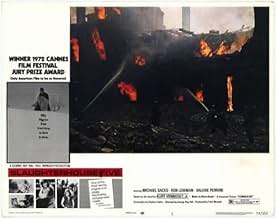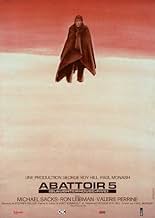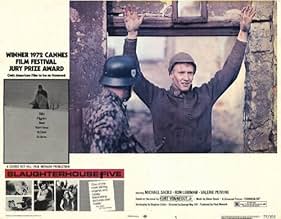Billy Pilgrim has mysteriously become unstuck in time. He goes on an uncontrollable trip back and forth from his birth in New York to life on a distant planet and back again to the horrors o... Read allBilly Pilgrim has mysteriously become unstuck in time. He goes on an uncontrollable trip back and forth from his birth in New York to life on a distant planet and back again to the horrors of the 1945 fire-bombing of Dresden.Billy Pilgrim has mysteriously become unstuck in time. He goes on an uncontrollable trip back and forth from his birth in New York to life on a distant planet and back again to the horrors of the 1945 fire-bombing of Dresden.
- Director
- Writers
- Stars
- Awards
- 3 wins & 4 nominations total
- German Leader
- (as Friedrich Ledebur)
- Young German Guard
- (as Nick Belle)
- Director
- Writers
- All cast & crew
- Production, box office & more at IMDbPro
Featured reviews
Let me safely say that Kurt Vonneguts 'Slaughterhouse 5' is my favourite book ever. It is incredibly funny and moving above any book I've ever read. But it is also a very complex and philosophical story with many deeply rooted undertones. As such, I strongly urge people to READ THE BOOK before you see this movie. A great many points are left unexplained to the viewer, assuming they have read Vonneguts version. As I read it beforehand, the movie didn't insult my intelligence by putting Vonneguts ideas in plain view. Instead, it relies faithfully on the viewers interpretations, not unlike the book.
Once again, unless you have a mind open like a 7-11, READ THE BOOK. Take my advice, and be immersed in the greatest story of the 20th century.
But George Roy Hill did an excellent job conveying the overall feel of the book -- the time jumping was flawless and I didn't find it hard to follow at all. The actor who played Billy Pilgrim captured Billy's passive, calm and vaguely anti-social demeanor. Lazarro, Montana and Billy's wife are also well played.
George Roy Hill had a knack for directing movies made from great books -- e.g., "The World According to Garp" -- and in the end, I was pleasantly surprised how well this movie turned out.
As far as the Vonnegut adaptations go (I know of four -- this one, "Mother Night," "Breakfast of Champions" and the god-awful "Slapstick") this one is the best of the bunch.
I've always wanted to see a movie version of "Sirens of Titan," but it'll probably never happen -- so "Slaughterhouse Five" is my only chance to "see" Trafalmadore.
Recommended to any true Vonnegut fans. Other people probably won't appreciate it.
This flawed movie was a cult classic since its release because legions of Vonnegut fans were so fond of the novel that they could overlook the film's flaws. This is probably the only Vonnegut novel to make the transition to the screen as a movie that more than a handful of people are willing to watch. And they watch it again and again. I am reminded of Voltaire lovers who enjoy Leonard Bernstein's Candide. This seems to be the best of all possible Vonnegut movies.
There is a wealth of trivia associated with the cast. Michael Sacks disappeared into obscurity. Sharon Gans joined a community theater company that seemed more like a cult. Holly Near became a feminist folksinger. Valerie Perrine would later give a great performance as Honey Bruce in Bob Fosse's Lenny. Perry King and Ron Liebman became minor stars.
The story is largely allegorical. It is not science-fiction. Vonnegut is coping with the trauma of World War II, particularly the horrors he witnessed during the firebombing of Dresden. Billy Pilgrim's emotional numbness and alientation are characteristic of combat fatigue or post traumatic stress. Despite the lack of a chronological plot, Billy Pilgrim's arc is linear.
To the uninitiated, being "unstuck in time" can be confusing. It's sort of like one's first encounter with hypertext. Perhaps, that's why the movie is better on the second or third viewing. The key to enjoying Slaughterhouse Five is to focus on the best scenes and performances -- much like Billy Pilgrim's advice on living.
If there's a weak element of the film, it's the bombing itself. By never letting the audience see outside the bomb shelter Pilgrim was in (and if so, not making it vivid enough for me to remember it), the horror and sheer magnitude of the event is downplayed. Two hundred thousand people died in the destruction of one of the greatest, most majestic cities in all of Europe, and all we're given is a shaking camera. Those who've read the book know that the trajedy was conveyed all to well by Vonnegut's skillful, near-photographic descriptions of the event and its aftermath. Very little of it made it to the screen.
Aside from that, George Roy Hill does an excellent job of communicating the existential dread of what must have been thought to be an unfilmable novel. The fate of Pilgrim's wife through her reckless driving could have come off as tasteless black comedy, but any cheap laughs are thankfully avoided, and the sequence is as shocking as it is heartbreaking. The really far-out parts of the novel (the four-dimensional aliens, Vonnegut's conception of the future and the end of the universe) are done with complete seriousness; another director might have had a condescending approach to the material, and killed the magic. The novel, by itself, is one of the best I've ever read -- it gleefully trashes the rules of standard novel-making, narration, and continuity, and manages to tell a real whale of a tale (there's a lot of weird stuff to swallow in it.) When I saw Hill credited as director, I moaned in agony, recalling the headaches that were induced by his smug, syrupy box office smashes "Butch Cassidy and the Sundance Kid" and "The Sting." After those two, I gave up all hope in Hill, the same way I did with Richard Lester after "Petulia" and "Help!" By the end of the movie, however, I ate my words. It's a beautiful, thought-provoking, and enchanting film, and does justice to a fine novel.
Did you know
- TriviaAlthough Kurt Vonnegut Jr.'s renowned refrain, "And so it goes", appears over 100 times in the novel, it it is not uttered even once in this film.
- GoofsWhen Billy Pilgrim is asked by the American soldiers, "Where's your rifle?", he replies that he doesn't have one because he's a chaplain's assistant. However, in the United States Army, the primary duty of the chaplain's assistant in a combat zone is to protect the chaplain, so all chaplain's assistants must carry rifles. Because Chaplains are considered ministers in uniform they are forbidden from carrying weapons even when in combat zone.
- Quotes
Billy Pilgrim: [in his sleep] You guys go on without me. I'll be alright.
Prof. Rumfoord: All he does in his sleep is quit, surrender, and apologize. I could carve a better man out of a banana.
- ConnectionsEdited into The Clock (2010)
- SoundtracksConcerto No. 5 for Harpsichord in F minor, BWV 1056 - 2nd movement 'Largo'
Written by Johann Sebastian Bach (as J.S. Bach)
Performed by Glenn Gould, Piano
Columbia Symphony Orchestra
Vladimir Goldschmann, Conductor
- How long is Slaughterhouse-Five?Powered by Alexa
Details
- Release date
- Country of origin
- Official sites
- Languages
- Also known as
- Slaughterhouse-Five
- Filming locations
- Prague, Czech Republic(as Dresden)
- Production company
- See more company credits at IMDbPro
Box office
- Budget
- $3,200,000 (estimated)
- Runtime
- 1h 44m(104 min)
- Sound mix
- Aspect ratio
- 1.85 : 1






































